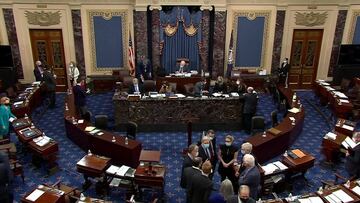2021 US economic deadlines: debt ceiling, infrastructure bill and government funding
President Biden has three key dates to pass his Build Back Better agenda and ensure that the US does not default on its debts and slip into recession.


Nine months after taking office, President Biden is now in the midst of perhaps the most crucial legislative spell of his presidency as he looks to pass the core of his Build Back Better agenda.
The Democrats currently wield unified power in Washington, holding the White House, the House of Representatives and, by the slimmest of margins, the Senate. This allows Biden to pass most economic legislation without any Republican support, using a congressional mechanism known as reconciliation, but he may lose that option in the 2022 mid-terms.
Read more
- Unemployment benefits reform could be in reconciliation bill
- $3.5 trillion reconciliation bill would lower the Medicare eligibility age
The is a concerted effort on behalf of the White House to push through the President’s priorities before the end of the year, with three key deadlines likely to dictate whether that effort is successful or not.
Raising the debt ceiling, 18 October
On Tuesday, Treasury Secretary Janet Yellen reiterated her belief that failure to raise the debt ceiling before 18 October would be catastrophic for the US economy. The Treasury Department estimates that after that date the federal government would exceed its borrowing limit, bringing about an unprecedented default on the national debt.
This likely would send the financial markets into freefall and, Yellen predicts, would bring about another recession. So far, Senate Minority Leader Mitch McConnell has said the GOP will refuse to support a permanent increase in the debt ceiling but confirmed in a recent statement that temporary suspension could be agreed.
McConnell told his colleagues he’s concerned about pressure on Manchin and Sinema to gut filibuster in order to raise debt ceiling, I’m told. He pointed to this as reason why he is floating short-term increase in order to ease pressure on and push Democrats to use reconcilation
— Manu Raju (@mkraju) October 6, 2021
Infrastructure and social investment legislation, 31 October
The two remaining pillars of President Biden Build Back Better agenda are encapsulated in the bipartisan infrastructure bill and a broader package which would see historic investment in social programmes. Senate Majority Leader Chuck Schumer has informed his caucus that they will look to pass the proposals before 31 October, when many of the existing transportation funding programmes expire.
However Biden is struggling to keep the disparate wings of his party united, and there is a real tension between the progressive and moderate wings. Progressives like Sen. Bernie Sanders have stated that the current proposals, estimated at around $3.5 trillion, are already too small; while Sen. Joe Manchin has stated his reluctance to pass anything costing more than $1.5 trillion.
Sen. Bernie Sanders (I-VT) to Sen. Joe Manchin (D-WV): “Is protecting working families and cutting childhood poverty an entitlement?” pic.twitter.com/2BAiBws5Ae
— The Recount (@therecount) October 6, 2021
Long-term federal funding bill, 3 December
Related stories
On 30 September, Congress narrowly avoided a government shutdown by passing 12 short-term spending bills. The bills are designed to provide funding for the federal government for the next 12 months, but after struggling to find agreement in the Senate, Democrats were forced to settle for a three-month stopgap package.
However that simply kicks the can down the road and Congress now has until 3 December to find a more permanent solution. If unable to do so the threat of another government shutdown is still there, which could negatively impact those hoping to receive Social Security or Child Tax Credit payments, as well as myriad other federally-funded services.

